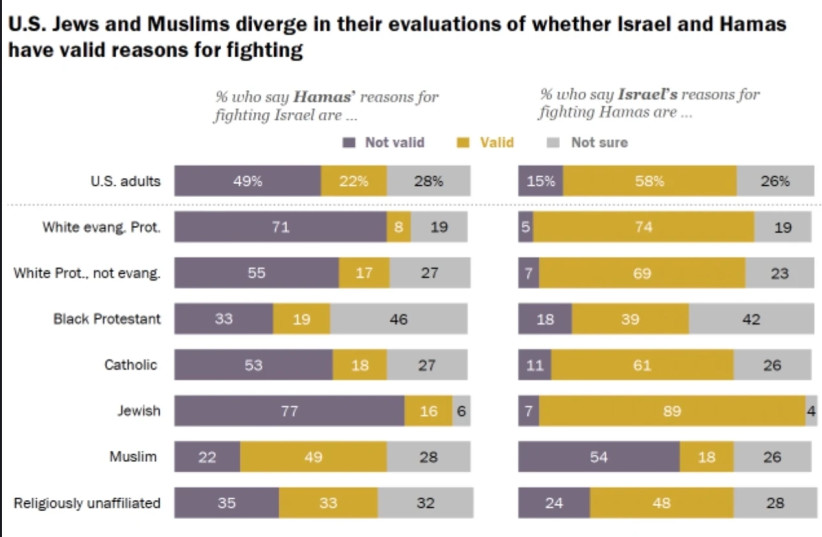An overwhelming majority of US Jews say Israel’s reasons for launching a war against Hamas are justified, and a substantial majority approve of how Israel is conducting the war.
The Pew Research Center study published Thursday is billed as the rare survey of sentiment about the war to include enough Jewish and Muslim respondents to garner an accurate reflection of their views.
It shows that Jewish views on the conflict are in many ways starkly different from those held by the rest of Americans. Far fewer US respondents overall see Israel’s rationale for the war, and its conduct in Gaza, as justifiable.
Asked whether Israel’s reasons for fighting Hamas are valid, 89% of Jewish respondents said yes, compared to 58% of Americans overall. Jews are the group most likely to see the reasons for fighting as valid, followed by white evangelical Protestants at 74%.
And asked whether Israel’s conduct during the war is acceptable, 62% of Jewish respondents said yes, compared to 38% of Americans overall.

The results also add context to national perceptions regarding who supports and opposes the war. Some opponents of the war have emphasized the Jewish groups and individuals who have joined them in protests. According to the survey, those Jewish protesters hail from the 33% of American Jews who say Israel’s conduct during the war is not acceptable — on par with Americans overall (34%).
Jews and Americans overall also showed a significant gap in the degree to which they are engaged with news about the war. Twenty-two percent of US adults say they are following the news “extremely” or “very” closely — compared to 61% of US Jews, the most of any demographic. Just 11% of Jews said they were not following the news at all, compared to 43% of Americans overall and 58% of young adults.
“This issue is challenging for many people – both emotionally and in terms of understanding the specifics of the war,” the authors of the report said in a statement. “Many Americans are also disengaged.”
The survey found that American Muslims are far less approving of Israel and far more understanding of Hamas than Americans overall. Nearly half of Muslim respondents said Hamas had valid reasons for fighting, compared to 22% of Americans overall and 16% of Jews.
Asked whether they approved of Hamas’ actions on Oct. 7, when it killed or abducted nearly 1,500 Israelis, the vast majority of respondents said no. Three quarters of Americans overall and 93% of Jews said the attack was not acceptable. Among Muslims, 49% said they thought the attack was unacceptable, while 21% said it was acceptable.
Just 5% of American Muslims said Israel’s conduct in the war was acceptable, and 68% said it was unacceptable. According to the Hamas-run Gaza health ministry, more than 31,000 Palestinians have been killed in the war. Israel says more than a third of those are combatants and blames Hamas for embedding in civilian populations.
Younger Americans are less likely to support Israel in the war
The survey also showed that younger Americans are less likely to support Israel, in keeping with a range of surveys in recent years. Among respondents ages 18-29, 38% said Israel’s reasons for fighting were valid, and 27% said they were not valid, while 34% said Hamas’s reasons were valid and 30% said they were not valid. The proportion of Americans who said Israel’s reasons for fighting were valid increased with each demographic band, up to 78% for Americans over 65.
Among the 18-29 demographic, 46% said the way Israel was fighting was unacceptable, while 21% said it was acceptable. Fifty-eight percent of that demographic said Hamas’ Oct. 7 attack was unacceptable, and nine percent said it was acceptable.
The party breakdown on the same question reflects the drift away from unquestioning support for Israel among Democrats, seen in the substantial number of primary voters voting “uncommitted” in democratic presidential primaries, part of a campaign to register anger with President Joe Biden’s support of Israel.
Among Republicans and those who lean Republican, 59% say Israel’s conduct in the war is acceptable and 17% say it is unacceptable. Among Democrats, it’s almost a flip-flop: 22% say Israel’s conduct is acceptable and 52% say it is unacceptable. The difference between Democrats and the 62%-33% acceptable/unacceptable breakdown among Jews is especially stark since substantial majorities of Jewish voters still support Democrats.
Americans were split on how President Joe Biden was handling the war, with 22% saying he favored Israel too much, 16% saying he favored the Palestinians too much, 21% saying he struck the right balance and 40% not sure.
More Americans favor sending humanitarian assistance to Palestinians than sending military assistance to Israel, with 50% favoring sending humanitarian assistance to Gaza and 36% favoring military assistance to Israel.
The survey was conducted from Feb. 13-25 via web survey of what Pew says is a nationally representative panel of randomly selected adults.
The margins of error were 1.5 percentage points for the entire sample of 12,693 Americans; 4.5 percentage points for the sample of Americans aged 18-29, numbering 909; 2.5 percentage points for the 3,844 Americans surveyed who were aged 30-49; 2.5 percentage points among those 50-64, numbering 3,511; and 2.4 percentage points aged over 65, numbering 4,396.
Broken down by religion, the margins of error were 3.3 percentage points for the 1,941 Jews surveyed; 8.4 percentage points for the 414 Muslims surveyed; and 3.6 percentage points for the 1,583 White Protestant evangelicals who took part.
By party, the margins of error were 2.2 percentage points for the 5,312 Republicans and lean-Republicans surveyed; and 2.1 percentage points for the 7,007 Democrats and lean-Democratic surveyed.
